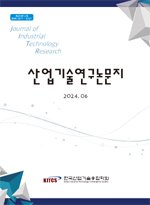노인의 여가만족과 사회적 건강이 주관적 건강상태에 미치는 영향
Impact of Leisure Satisfaction and Social Health on Self-Rated Health Among Older Adults
- 한국산업기술융합학회(구. 산업기술교육훈련학회)
- 산업기술연구논문지
- 제29권 4호
-
2024.1217 - 28 (12 pages)
-
DOI : 10.29279/jitr.k.2024.29.4.17
- 94

노인은 여가 활동을 통해 다양한 사회적 관계를 형성하고 정서적 안정감을 얻는다. 이러한 긍정적인 상호작용은 노인의 사회적 건강을 증진시키고 스트레스 및 우울증 위험을 줄인다. 따라서, 노인의 여가만족과 사회적 건강이 전반적인 건강상태를 반영하는 주관적 건강상태에 대한 영향을 확인할 필요가 있다. 본 연구는 이 두 요소가 주관적 건강상태에 미치는 영향을 파악하고, 여가 프로그램 개발 및 사회적 지원망 확대, 건강 관리 정책 수립을 위한 기초자료를 제공하고자 한다. 2024년 6월부터 7월까지 G도에 거주하는 65세 이상 노인 214명을 대상으로 여가만족, 사회적 건강, 주관적 건강상태를 측정하는 설문을 실시하였으며, SPSS 28.0을 이용해 다중 회귀 분석을 진행하였다. 연구결과, 노인의 여가만족은 사회적 건강(r=0.456, p<.001) 및 주관적 건강상태(r=0.353, p<.001)와 긍정적 상관관계를 보였고, 사회적 건강 또한 주관적 건강상태와 긍정적 상관관계를 보였다.(r=0.387, p<.001) 여가만족과 사회적 건강이 주관적 건강상태에 미치는 영향은 통계적으로 유의미하며 설명력은 18.2%였다. 본 연구 결과를 바탕으로 노인의 주관적 건강상태 관련 요인의 지속적인 탐색과 여가만족과 사회적 건강을 고려한 주관적 건강상태 향상을 위한 중재 프로그램의 필요성을 제안한다.
This study aimed to explorethe relationships among leisure satisfaction, social health, and subjective health in older adults. It investigated how social interactions through leisure activities contribute to emotional stability, stress reduction, decreased depression, and overall well-being. Data were collected in June and July 2024 from 214 seniors aged 60 and older and residing in G City. Multiple regression analysis revealed significant correlations between leisure satisfaction and social health (r=0.463, p<.001), leisure satisfaction and self-rated health (r=0.355, p<.001), and social health and self-rated health (r=0.390, p<.001). These findings indicate that leisure satisfaction and social health significantly influence self-rated health among older adults. This study underscores the need for developing programs that focuson improving the social health of older adults to enhance their perceived overall health.
Ⅰ. 서 론
Ⅱ. 연구 방법
Ⅲ. 연구 결과
Ⅳ. 고 찰
Ⅴ. 결론 및 제언
References
(0)
(0)